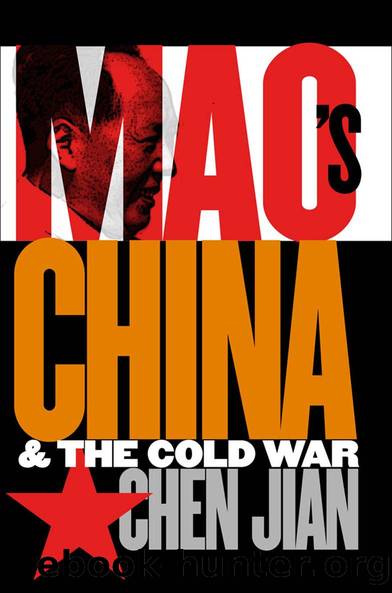Mao's China and the Cold War by Jian Chen

Author:Jian Chen [Chen, Jian]
Language: eng
Format: epub
ISBN: 9780807849323
Barnesnoble:
Publisher: The University of North Carolina Press
Published: 2001-06-25T00:00:00+00:00
Beijingâs Increasing Support to Hanoi, 1963â1964
Beijingâs policy toward Vietnam began to take a radical turn in late 1962 and early 1963. In the summer of 1962, a DRV delegation led by Ho Chi Minh and Nguyen Chi Thanh visited Beijing. The Vietnamese summarized the situation in South Vietnam, emphasizing the possibility that with the escalation of military conflicts in the South, the United States might use air and/or land forces to attack the North.12 The Chinese leaders were very much alarmed by this assessment. In a meeting with the DRV defense minister, General Vo Nguyen Giap, on 5 October, Mao Zedong emphasized that âin the past several years, we did not think much about whether or not the imperialists might attack us, and now we must carefully think about it.â13 Accordingly, Beijing offered to equip an additional 230 Vietnamese battalions.14
Beijing made general security commitments to Hanoi throughout 1963. In March, a Chinese military delegation headed by Luo Ruiqing, PLA chief of staff, visited Hanoi. Luo told Vietnamese leaders that if the Americans were to attack North Vietnam, China would come to its defense. The two sides also discussed how they should coordinate their operations in the event that America invaded North Vietnam.15 In May, Liu Shaoqi visited Vietnam, and in his meetings with Ho Chi Minh and other DRV leaders, he promised that if the war expanded as the result of their efforts to liberate the South, they could âdefinitely count on China as the strategic rear.â16 In September, the leaders of four Communist parties (Zhou Enlai from China, Ho Chi Minh, Le Duan, and Nguyen Chi Thanh from Vietnam, Kaysone Phomvihane from Laos, and D. N. Aidit from Indonesia) held an meeting in Chonghua, Chinaâs Guangdong province. In a keynote speech, Zhou Enlai pointed out that Southeast Asia had been the focus of a confrontation between international revolutionary and reactionary forces. He encouraged Communist parties in this region to promote an anti-imperialist, antifeudal, and âantiâcamprador capitalistâ revolution by mobilizing the masses and conducting armed struggles in the countryside. He also emphasized that China would serve as the great rear of the ârevolution in Southeast Asiaâ and would try its best to support the anti-imperialist struggles by the people in Southeast Asian countries.17
Beijingâs leaders certainly were willing to turn these promises into actions. In October, Kaysone Phomvihane, head of the Laotian Peopleâs Revolutionary Party (the Communist Party), secretly visited Beijing. He requested Chinaâs support for the Communist forces in Laos for their military struggles and base-area buildup. Zhou Enlai agreed to the request. As the first step, a Chinese work team, headed by General Duan Suquan, entered Laos early the next year âto investigate the situation there, as well as to prepare conditions for large-scale Chinese assistance.â18 At the end of 1963, after the Johnson administration demonstrated its intention to expand American military involvement in Vietnam, military planners in Beijing suggested that the Vietnamese strengthen their defensive system in the Tonkin Delta area. Hanoi asked the Chinese to help complete the construction of new defense works there, to which the Chinese General Staff agreed.
Download
This site does not store any files on its server. We only index and link to content provided by other sites. Please contact the content providers to delete copyright contents if any and email us, we'll remove relevant links or contents immediately.
Harry Potter and the Goblet Of Fire by J.K. Rowling(3078)
Unfinished: A Memoir by Priyanka Chopra Jonas(2918)
Never by Ken Follett(2910)
Machine Learning at Scale with H2O by Gregory Keys | David Whiting(2317)
The Man Who Died Twice by Richard Osman(2309)
Fairy Tale by Stephen King(2090)
Will by Will Smith(2061)
Rationality by Steven Pinker(1773)
The Storyteller by Dave Grohl(1667)
The Dark Hours by Michael Connelly(1579)
The Dawn of Everything: A New History of Humanity by David Graeber & David Wengrow(1577)
The Stranger in the Lifeboat by Mitch Albom(1549)
Cloud Cuckoo Land by Anthony Doerr(1446)
New Morning Mercies: A Daily Gospel Devotional by Paul David Tripp(1375)
Friends, Lovers, and the Big Terrible Thing by Matthew Perry(1343)
The Becoming by Nora Roberts(1338)
Crying in H Mart by Michelle Zauner(1330)
Einstein: His Life and Universe by Walter Isaacson(1320)
A Short History of War by Jeremy Black(1304)
